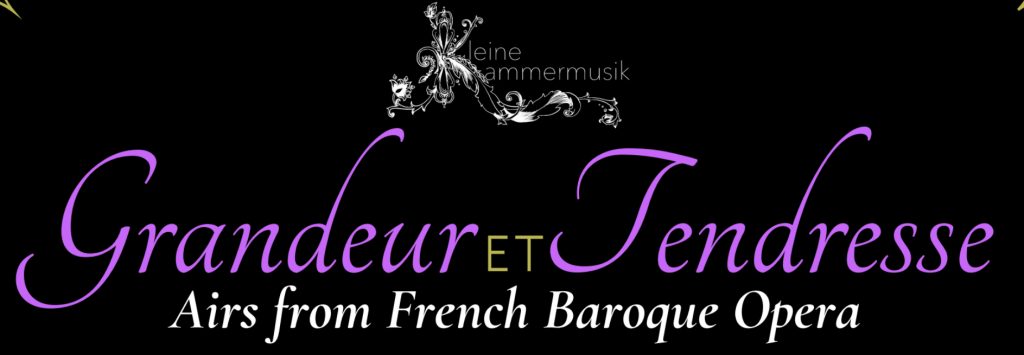Artists
Program
Preview
Performances
Bios
Artists
Kleine Kammermusik
Geoffrey Burgess, Oboes and Recorders
Margaret Owens, Oboes and Recorders
Stephanie Corwin, Bassoon
Rebecca Humphrey, Cello
Leon Schelhase, Harpsichord
Program
Click for Printable/Viewable Program
Grandeur et Tendresse: Airs from French Baroque Opera (Spring, 2021)
The Ouverture to Lully’s Armide sets the stage for our concert and captures both the stately poise and effervescent spirit characteristic of French baroque opera. From there our program unfolds through charming vocal airs, lively dances, and sophisticated instrumental interludes as we journey through the world of the French theater.
Armide, Ouverture
Jean-Baptiste Lully (1632-1687)
Ritournelle from Céphale et Procris
Élisabeth Jacquet de la Guerre (1665-1729)
“La Cupis”
Jean-Philippe Rameau (1683-1764)
“Goutons un doux repos”
Michel Lambert (1610-1696)
“Vos mépris”
Michel Lambert
“Ombre de mon Amant”
Michel Lambert
“Air pour les divinités de la terre”
André Cardinal Destouches from Marthésie (1672-1749)
Minuet from Première Concert, Concerts Royaux
François Couperin (1678-1733)
From Pièces en Trio in C Major
Marin Marais (1656-1728)
Fantaisie – Sarabande – Chaconne
“Air des Bacchantes”
François Couperin
from Huitième Concert, Les Goûts-Réunis
Program Notes
We begin (as any opera should) with an overture: this one to Armide, Lully’s last tragédie en musique. The founder of the French opera tradition, Jean- Baptiste Lully also invented what came to be known as the stile majestueux (or majestic style) that we hear in the opening processional sections of his French overtures. Designed to announce the arrival of the king for his grand operatic celebration, the majestic opening is countered by a faster music in imitative style, often rounded out with a return to the opening solemnity. The vigorous rhythms of the middle section in the overture to Armide belie the depth of the tragedy it precedes.
The ritournelle from Céphale et Procris displays the elegant compositional style of Elisabeth Jacquet de la Guerre, the only female composer active at the Paris Opéra in the 18th century. This music heralds the arrival of the eponymous heroine with allegorical figures exemplifying the feminine qualities of voluptuousness, pleasure, and grace.
“La Cupis” from the fifth of Jean-Philippe Rameau’s Pièces de clavecin en concert represents a multi-layered association with opera. The title alludes to Marie-Anne Cupis, known as La Camargo, who had established a dazzling reputation as principal ballerina at the Opéra, and who Rameau likely got to know around the time he published his pieces for obbligato harpsichord and accompanying instruments just one year after the première of his first opera Hippolyte et Aricie in 1733. He later reworked “La Cupis” as part of his La Temple de la Gloire, a grandiose opéra de circonstance written in 1745 to celebrate a French military victory. Normally heard on flute and viola da gamba, our version with two oboes brings added piquancy and vocality to this exquisite music.
The ground bass, usually in the form of a slow stepwise descent repeated incessantly below the melodic parts, was the pervasive emblem of lament found across many operas in intimate scenes where a character expresses loss or longing. Goûtons un doux repos and Vos mépris are prime examples by Lully’s father-in-law, Michel Lambert, the father of French operatic vocal style. The sweetness of isolation amidst love’s tempests, and the acceptance of suffering from a scorned lover are the emotions that Lambert captures with simplicity and grace. These are stand-alone airs but prefigure the operatic air. The richly-scored introduction and epilogue to Vos mépris display how instruments
dialogued with and provided lavish frames for the vocal solos (here taken by the bassoon), a formula that is followed again in Ombre de mon amant.
This cry to the lover’s specter is answered by creatures that rise from the nether regions in the Air pour les divinités de la terre from Destouches’s opera Mathésie, concerning the queen of the Amazonian nation. The vigor of these superhuman women’s dance presented in an arrangement for cello and continuo lead us to a wistful minuet from François Couperin’s Concerts royaux, played on cello and bassoon.
Our final set comes from Marin Marais’s Pièces en trio—the first book of trio sonatas to be published in France (1692). Although not written for the theatre, this music is by one of the most important opera composers in the post- Lullian period, and is itself strongly theatrical. The string of three dances we have chosen from the first suite could well have been lifted from one of his operas. The grand chaconne is a particularly fitting conclusion to the instrumental suite: imagine the whole company of singers and dancers assembled on stage for the operatic apotheosis. The musical scoring, with its vivid evocation of choreographic gestures, kaleidoscopic shifts of style, and the switches between oboes and recorders over yet another ground bass, provides moments for everyone to shine.
We send in the clowns with Couperin’s playful Air des bacchantes, bringing our little drama to its happy conclusion.
—Geoffrey Burgess and Margaret Owens
Preview
Performances
Musicivic Everywhere
7:30 PM ET Fri May 21, 2021 (Ambler)
7:30 PM ET Wed June 2, 2021 (Early Music Wednesdays)
3:00 PM MT Sun June 13, 2021 (3VCP)
Free Tickets
Ambler Musicivic
3:00 PM ET Sun May 16, 2021
7:30 PM ET Fri May 21, 2021
Free Tickets
Twin Forks Musicivic
3:00 PM ET Sun May 23, 2021
7:30 PM ET Fri May 28, 2021
Free Tickets
Big Sky Musicivic
3:00 PM MT Sun June 13, 2021
7:30 PM MT Fri June 18, 2021
Free Tickets
Three Village Chamber Players
3:00 PM ET Sun June 20, 2021
7:30 PM ET Fri July 2, 2021
Free Tickets
Oakmont Musicivic
TBD
Free Tickets
Bios
Geoffrey Burgess
Oboe and Recorder
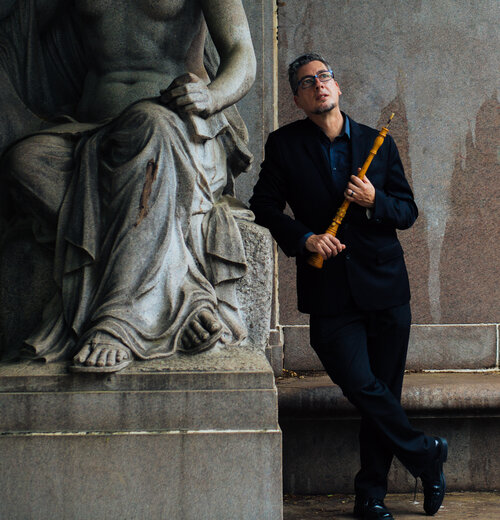
Geoffrey Burgess began playing the oboe in Sydney, Australia and, after specialized study in the Netherlands, moved to the US where he has worked as freelance performer and writer for the past thirty years. In addition to appearing as soloist with orchestras from Sydney to Washington, and Amsterdam to Bogotá, he was associated for twenty years with the Paris-based company Les Arts Florissants, where he developed a close affinity for French Baroque style. Equally at home with the music of Bach, he is principal oboist with the Washington Bach Consort, and appears regularly with Trinity Baroque Orchestra in New York, the North Carolina Bach Akademie, and Pegasus Early Music in Rochester. His recordings include solo music from the Bach family and newly commissioned works with harpsichordist Elaine Funaro. Geoffrey’s contributions as a stylish performer are complemented by his inspirational publications on musical interpretation. Driven by a curiosity to understand music in its historical context, his extensive list of writings investigate the cultural history of the oboe, opera, and other aspects of historically inspired performance. The Oboe (Yale, 2004), written in collaboration with Bruce Haynes, is the standard reference work on the subject; Well-Tempered Woodwinds is both a biography of influential recorder builder Friedrich von Huene and a history of the early music revival in the US. His current project is a work of historical fiction exploring the life of an eighteenth-century musician. Geoffrey’s creative energy extends to instrument building, and he has collaborated with Joel Robinson on oboes based on Baroque and Classical models. Geoffrey holds a PhD in Music History from Cornell University, has taught on the faculties of Stony Brook, Columbia and Duke Universities, and is sought after as a gifted pedagogue in masterclasses and workshops. He is currently the baroque oboe instructor at the Eastman School of Music in Rochester, NY. Based for over a decade in Philadelphia, Geoffrey lives with his husband Leon Schelhase and their cat Luc among harpsichords and a small but select collection of original oboes.

Margaret Owens
Oboe and Recorder
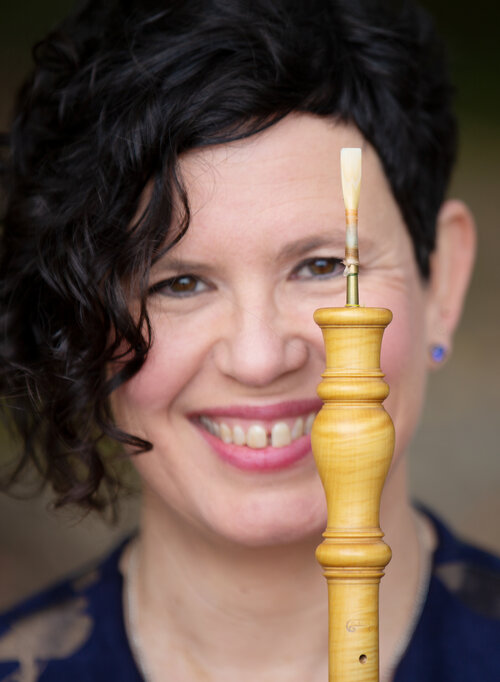
In demand throughout North America as a performer and teacher on historical oboes, Margaret Owens is a founding member of the chamber music group Kleine Kammermusik, whose 2017 album Fanfare and Filigree (Acis) has received critical acclaim. She is on faculty in the historical performance institutes of Indiana University’s Jacobs School of Music and the Peabody Institute of Johns Hopkins University; at both institutions, her work centers around broadening the study of historical oboes, from playing the instruments to exploring the performance practices specific to the 18th century. Margaret earned degrees in oboe performance at the University of North Carolina at Greensboro, the Manhattan School of Music, and the City University of New York, where her doctoral work focused on oboe bands and their role in the entertainments at Louis XIV’s court, and led to further exploration and expertise in the French baroque masquerade.
A native of eastern North Carolina, Margaret lives in Fairfax, Virginia with her music-historian husband and computer-enthusiast son. She is an active participant in the musical life of the Washington, DC area where she is a member of numerous period-instrument orchestras. Margaret has seen much of the US in her travels to play with groups spanning from San Francisco to Boston. Her summers are spent onstage at the Charlotte Bach Festival, the Staunton Music Festival, and teaching at the Oberlin Baroque Performance Institute and Amherst Early Music Festival.

Stephanie Corwin
Bassoon
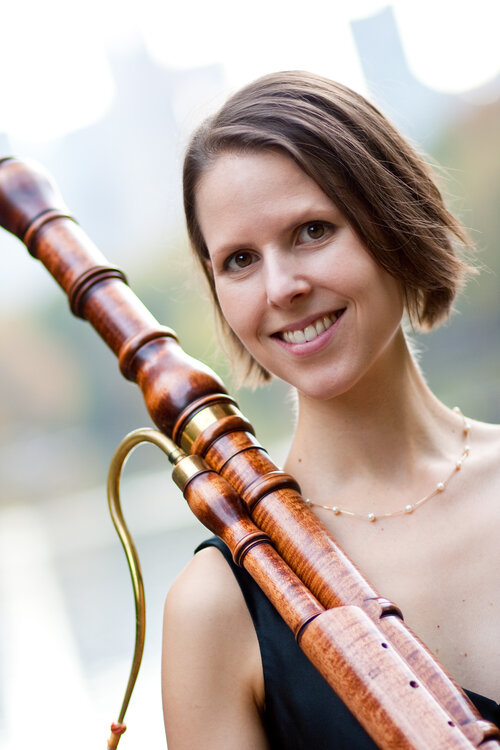
Based in New York City, Stephanie enjoys an active career performing and teaching music of the past four centuries on modern and historical bassoons. Whether premiering a new work under an elevated subway line in Queens or playing baroque chamber music in a historic house, she enjoys discovering what makes each work special, and sharing it with others. Her vocation has taken her throughout the US and abroad, simultaneously satisfying her love for travel and her desire for connecting with people both on and off the stage. Highlights include solo appearances at Lincoln Center and Carnegie Hall, chamber-music performances at Yellow Barn and Staunton festivals, and concerts with Philharmonia, Tafelmusik, Trinity Wall Street, and Handel and Haydn Society. In addition, Stephanie is honored to have been the inaugural winner of the Meg Quigley Vivaldi Bassoon Competition, which creates opportunities for young female bassoonists from the Americas.
After graduating from Davidson College, Stephanie earned her Master of Music degree from Yale University and a Doctorate of Musical Arts from Stony Brook University, studying with Frank Morelli at both institutions. It was during her time at Stony Brook that she became intrigued by the engaging and informed approach of historical performance. As a result, she went on to study with Michael McCraw at Indiana University, where she received a Performer Diploma in historical bassoons.
Of all areas of performance, Stephanie values the intimate collaborations encouraged through chamber music the most. She is a core member of both Kleine Kammermusik and Repast, and as Kleine Kammermusik’s marketing director, she manages the ensemble’s website, social media, press, and advertising materials to further the group’s connection to the community. When not making music, Stephanie can be found out on a run, lost in a book, or working on her next knitting or sewing project. She lives in the wonderfully diverse neighborhood of Jackson Heights, Queens with her husband Joe and Sammy, their orange cat.

Rebecca Humphrey
Cello and Viola da Gamba
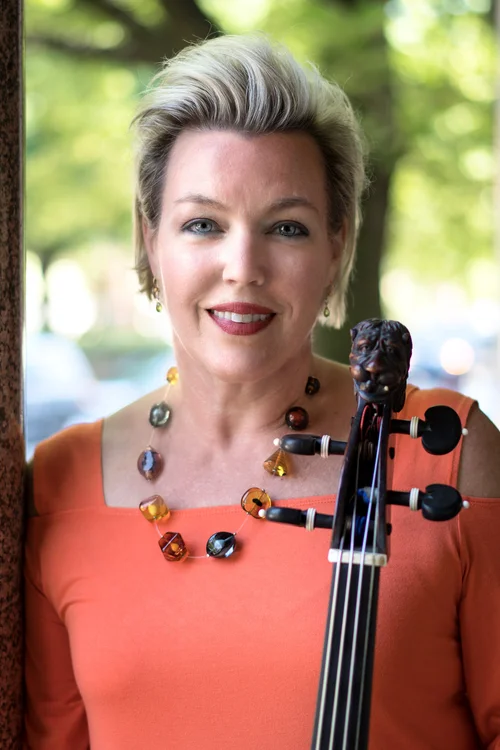
Cellist and gambist Rebecca Humphrey lives and works in the Philadelphia area where she is an active freelancer, performing with many US early music ensembles. While attending Oberlin College, Rebecca was introduced to the world of early music. This newfound passion took her to Minneapolis after graduation, where she continued her studies at the University of Minnesota. There she served as the principal cellist of the Lyra Consort for twelve years and performed with many baroque ensembles in the Midwest. Having also lived in Switzerland and Australia, Rebecca has contributed to the riches of the international music scene, mostly notably with Kammerensemble Luzerne, Capriccio Basel, and Latitude 37 (Melbourne). As a Bach specialist, Rebecca’s crafting of bass lines, solos, and vocal accompaniment makes her a sought-after ensemble player. Passionate about the intimate and collaborative nature of chamber music, Rebecca is a founding member of many ensembles in addition to Kleine Kammermusik, including Night Music, aMuse, the Franklin Quartet, Galline, and Belladonna Baroque Quartet, which has performed extensively in the US and Brazil. Her love for cooking and entertaining goes hand in hand with her work as Kleine Kammermusik’s fundraising director, cultivating a network of support for the ensemble. When not playing cello or viola da gamba (and now also melodica—after a few glasses of Viognier), you will find Rebecca on the tennis court or relaxing in the Allegheny Mountains of western Pennsylvania.

Leon Schelhase
Harpsichord
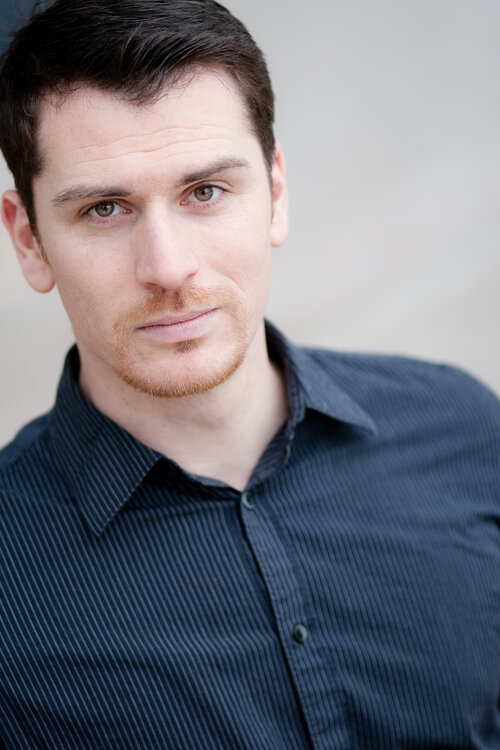
A native of Cape Town, Leon Schelhase found Baroque music resonating with himself from an early age. Having been the first person in South Africa to receive a performance degree in harpsichord (University of Cape Town), he moved to the US in 2006 to undertake advanced musical studies at Boston University. Since then he has been in demand internationally as a soloist, ensemble player, and chamber musician.
Being an adventurous soul and loving to travel, Leon has been fortunate to experience the world through music. Having performed in Japan, Australia, Europe, South America, his native South Africa, and the United States, he has chosen the historic city of Philadelphia as his home, where he lives with his husband and charming cat. Some performances that have shaped his career as a sought-after collaborator and soloist include what critics described as an “epoch-making performance” of J.S. Bach’s St Matthew Passion in Japan and concerts with violinist Libby Walfisch in London, UK. Leon’s dedicated approach to Baroque performance practice—specifically, the music of J.S. Bach—has led to various performances of the Goldberg Variations around the US and festival bookings in Europe, the most recent being the Festival Risonanze in Malborghetto, Italy. He also regularly collaborates with violinist Robert Mealy in recurring performances of Bach’s six violin sonatas.
As an ensemble player, Leon values the deep connection of intimate collaborations and enjoys his continued work with viol specialist, Sarah Cunnigham, mezzo-soprano Clara Osowski and, most importantly, the virtuoso wind ensemble Kleine Kammermusik. An advocate for historic keyboard performance, Leon is the founder and director of Ravensong Historic Keyboard Series, a Philadelphia-based concert series that presents world-renowned specialists of historic stringed keyboard instruments in uniquely curated spaces. Since 2012 he has been on faculty at the Curtis Institute of Music, where he has been integral to the design of instruction in historic performance practice.
MC21-0014

